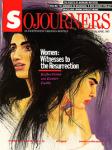When 1,400 evangelical Christians gathered in Pasadena, California, in 1983 to consider various "biblical perspectives on peacemaking," a wide range of views was expressed from the pulpit. Sen. William Armstrong, a conservative Republican from Colorado, and Dr. Ed Robb, chair of the Institute on Religion and Democracy (IRD), called for evangelicals to support the government policy of "peace through strength." Rev. David Breese, a radio evangelist from Wheaton, Illinois, went so far as to say that "nuclear weapons are no threat to world peace when they are in the hands of the U.S."
Most conference participants clearly differed about the danger of nuclear weapons, American and otherwise; Breese's statement was met by a chorus of audible groans from the audience. The gathered evangelicals heartily applauded speakers like Ronald J. Sider, president of Evangelicals for Social Action, Jim Wallis of Sojourners, and others who condemned the nuclear arms race and urged Christian peace activism.
Conservatives were troubled by the growing peacemaking activity among grassroots evangelicals. As a result the National Association of Evangelicals (NAE) commissioned a survey of evangelical institutions to explore evangelical involvement in peacemaking. The NAE report on the survey stated that evangelical institutions, especially at the college level, "have looked almost exclusively to Sojourners and Evangelicals for Social Action...for counsel on these crucial issues." The NAE's newsletter said that this represented "disproportionate influence" by organizations "whose working premises include a sharp critique of national security policy."
To counter this perceived tilt toward peace activism among evangelicals, the NAE began a new "Peace, Freedom, and Security Studies Program" and set out to produce a set of guidelines for "thoughtful" participation in what it calls the "war/peace debate."
To help produce the guidelines, the NAE sought the aid of the staunchly anti-communist World Without War Council and its neo-conservative "scholar-in-residence" George Weigel. The council was established in the 1960s in response to the successes of the peace movement opposing the Vietnam War.
According to church peace activists in cities where the council operates, it has been a thorn in the side of local peace initiatives for years. Weigel, who was based in Seattle, Washington, from 1977 to 1984, was a constant critic of Archbishop Raymond Hunthausen's peace stance, and according to Don Hopps of the office of Catholic Charities in Seattle, "He's been critical of every other organization in the peace movement, too." Hopps expressed surprise that Weigel, a conservative Catholic working for a secular political organization, would be employed to draft a document for evangelical Christians.
Weigel's Cold War perspective is readily evident in the NAE guidelines, which were issued in October 1986. The paper begins with the explicit acceptance of the "legitimacy of American security concerns," and that bias undermines its credibility and usefulness to the Christian community. The authors intend to speak as "committed Christians and as committed Americans," but the viewpoint that emerges seems more provincial American than biblical Christian.
For example, the policy goals of the program are sprinkled liberally with phrases like "a commitment to the common defense," and "We want an America strong enough to...influence the course of world affairs." One would expect Christian guidelines on peacemaking to acknowledge that at times the church and the state might well have divergent perspectives on foreign policy.
Alan Geyer, director of the Churches' Center for Theology and Public Policy, criticized the NAE document for its "ideological taint, dubious facticity, and questionable prescriptions." A historic peace church official familiar with the paper decried the "weak and narrow" biblical and theological content as "shameful" and "distressing" and remarked on the irony that, compared with the Catholic and United Methodist peace pastorals, the NAE letter is "not very evangelical."
THE NAE RENDERS ITSELF marginal to the church debate on nuclear weapons by its failure to address the central ethical issue of the atomic age: Can the possession and use of nuclear weapons be justified as moral by the Christian church? The U.S. Catholic bishops gave "conditional acceptance" to the possession of nuclear weapons in the context of progress toward disarmament. The United Methodist bishops rejected their very possession, saying instead that "deterrence must no longer receive the church's blessing, even as a temporary warrant for the maintenance of nuclear weapons." In contrast, the NAE is conspicuously silent on the issue and thus, by not challenging U.S. nuclear strategy, gives its tacit blessing to the status quo.
The greatest danger of the NAE paper is not its conservative political stance. There is nothing wrong with honest dialogue between Christians of opposing political perspectives, as was shown by the Pasadena conference. The problem comes in the paper's pretense of being something that it isn't - a wolf in sheep's clothing, as it were.
The document uses sophisticated political argumentation and carefully nuanced rhetoric to bolster its claims of "moderation" and "balance," while in truth it is an opening salvo of the conservative attack against the growing evangelical peace movement. The effect of such sophistry is to confuse its readers rather than call them to action.
Ultimately, the failure of the NAE guidelines lies in a lack of Christian hope that the redemptive power of divine mercy is finally greater than human sinfulness. In the balance-of-power politics of the NAE paper, our security resides in the faith that the horror of nuclear annihilation will keep the world's evil at bay. A document based more on the gospel of Jesus and less on the "realism" of Reinhold Niebuhr would be a far greater contribution to evangelical peacemaking.
Jim Rice is editor of Sojourners.

Got something to say about what you're reading? We value your feedback!
